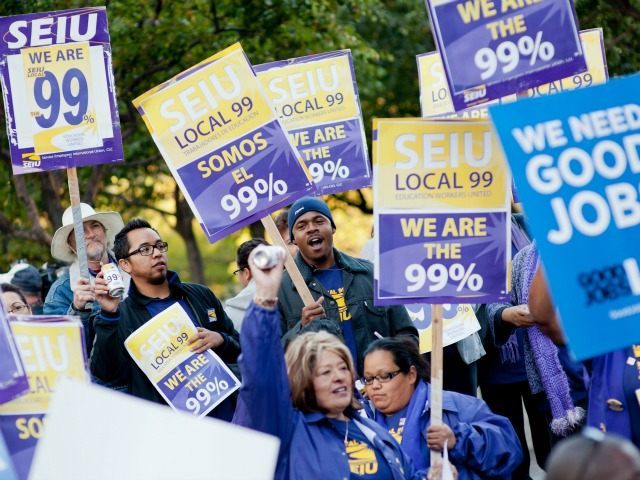The far-left progressive leader of the huge SEIU union admits that many or most of her blue-collar members are sympathetic to Donald Trump’s pro-American populist message.
“I am deeply concerned about what is stirring, even in our membership… where our members are responding to Trump’s message,” she told David Axelrod, the chief campaign strategist for President Barack Obama’s election in 2008.
Can you see Trump winning the election? Axelrod asked. “Yea, I could, I could,” said Mary Kay Henry, the international president of the Service Employees International Union.
“Sixty-four percent of our public members identify as conservative, and are much more interested in the Republican debate than the Democratic debate at the moment,” she admitted.
“Our white conservative membership that we hear is responding to Trump’s appeal are more concentrated in the Midwest and the South,” she said. That’s critical, because the GOP candidate must do well in the Midwest to overcome the Democrats’ advantages in the immigration-heavy coastal states. That claim of support is backed up by a recent Democratic survey.
To stomp on Trump’s support, union’s leaders are personally pressuring the members, she said.
“We’re doing one-on-ones with every one of our members right now,” said Henry. “We’re going into hyperdrive, especially in the pockets of our membership that have a lot of Muslim leaders to stand against what is being said” by Trump, she said.
The interview was conducted Jan 4. The comments about Trump’s message are mostly just after the 40-minute mark.
https://soundcloud.com/the-axe-files/ep-21-mary-kay-henry
Henry’s huge union claims a membership of roughly 2 million blue-collar workers, but is actually run by a professional cadre of far-left progressives. That leadership means the union’s priorities including many progressive goals, such as greater immigration, more federal regulation of police and boosting the Democrats’ power, beyond the labor-market task of fighting for wage and benefits increases for its members.
For example, Henry said getting citizenship for more migrants is a “core agenda” for the union, even though any inflow of unskilled migrants pushes down wages for blue-collar Americans. In 2013, for example, Obama added 2 million foreign workers to the U.S. economy, just as 4 million young Americans began looking for jobs.
Henry is typical of these university-trained leaders who exploit unionized workers to win progressive goals. She told Axelrod that she began her political life as a lesbian activist working with other union progressives, not as a blue-collar worker working with other Americans. She’s also a strong supporter of Hillary Clinton.
Trump is getting support, she admitted, because wages have been flat, and because “he’s touching this vein of the terrible anxiety that working-class people feel about their current status, but more importantly, how terrified they are for their kids, not being able to do as well as they have, never mind doing better.”
“That broken sense of the future… is what we found” when surveying members, she said.
Henry reserved her strongest criticism for Trump’s popular pro-American labor-force policies, which include the construction of border wall to stop the illegal migration of cheap foreign labor into Americans’ workplaces.
Those pro-American policies — previously pushed by former Sen. Rick Santorum, and now partially echoed by Sen. Ted Cruz — would reduce the supply of cheap labor, perhaps creating pressure to increase wages for Americans. But Henry insisted they’re “hate and divisiveness.”
Trump’s promise to build a wall against illegal migration “is horrific in my mind and reminds me of [GOP Gov.] Pete Wilson in California,” said Henry.
In 1994, Wilson support Proposition 187 to block state funding and support for illegal migrants. That measure was overwhelmingly approved by voters, including by many Latinos, and Wilson won his race for governor. But the popular law but stopped and then gradually choked to death in 1999 by an alliance of progressive activists, lawyers, judges and journalists, plus a new Democratic Governor.
“Pete Wilson won” his election, Axelrod noted.
“I know, I know, that’s why I think this is a very dangerous political moment for our country,” she responded.
Progressives are strong supporters of cheap-labor policies, partly because it increase the population of left-leaning immigrants. that policy has been spectacularly successful in California since the progressives stopped Proposition 187. The state now is dominated by the Democratic coalition, and has become one of the most economically unequal states in the union.
Henry’s deputies are telling their members that more government is the solution to their financial problems. “Your vote does matter because you can elect a politician that could take action that would make a difference on your wages, either through minimum wages or demanding wage boards,” she said. That is “the antidote to the fear that is being stoked,” by Trump , she said.
However, Henry’s promise of higher minimum wages comes packaged with a slew of progressive priorities — higher status for gays, more federal regulation to change the weather in 2040, and especially, more immigrants. Those extra migrants will compete for blue-collar and white-collar jobs, drive down wages so progressive union leaders become more important, crowd into unionized teachers’ classrooms, and eventually, get citizenship so they can vote for Democratic candidates to fundamentally transform the United States.

COMMENTS
Please let us know if you're having issues with commenting.